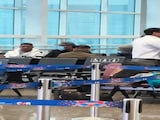An Aladdin's cave of goods ranging from IKEA furnishings to tens of thousands of livestock is stuck in a maritime traffic jam caused by the Suez Canal blockage.
More than 360 vessels have been stranded in the Mediterranean to the north and in the Red Sea at the other end as well as in holding zones since giant container ship MV Ever Given was wedged diagonally Tuesday across the Suez, a lifeline for world trade.
Industry experts have estimated the total value of goods marooned at sea at anywhere between $3 billion and $9.6 billion.
Some 1.74 million barrels of oil a day is normally shipped through the canal, but 80 percent of Gulf exports to Europe pass through the Sumed pipeline that crosses Egypt, according to Paola Rodriguez Masiu of Rystad Energy.
According to MarineTraffic, about 100 ships laden with oil or refined products were in holding areas Sunday.
Crude prices shot up on Wednesday in response to the Suez blockage before dropping the next day.
Sanctions-hit Syria, however, on Saturday announced a new round of fuel rationing after the hold-up delayed a shipment of oil products from ally Iran.
'Adds to volatile situation'
Apart from goods, some 130,000 head of livestock on 11 ships sent from Romania have also been held up.
"My greatest fear is that animals run out of food and water and they get stuck on the ships because they cannot be unloaded somewhere else for paperwork reasons," Gerit Weidinger, EU coordinator for NGO Animals International, told British newspaper The Guardian.
Egypt, for its part, has sent fodder and three teams of vets to examine livestock stuck at sea, some bound for Jordan.
Sweden's IKEA said it has 110 containers on the stricken Ever Given and other ships in the pile-up.
"The blockage of the Suez Canal is an additional constraint to an already challenging and volatile situation for global supply chains brought on by the pandemic," an IKEA spokesperson said.
The Van Rees Group, based in Rotterdam, said 80 containers of tea were trapped at sea on 15 vessels and said there could be "chaos" for the company as supplies dried up.
Dave Hinton, owner of a timber company in northwest England, said he had a consignment of French oak stuck on a ship.
The oak had been sent from France for reprocessing into veneered flooring in China, and was on its way back to a customer in Britain, Hinton said.
"I've spoken to my customer and told him the bad news that his floor was blocking the Suez Canal. He didn't believe me, he thought I was pulling his leg," he told BBC radio on Friday.
Shipping giants such as Denmark's Maersk have re-routed ships to the longer journey around South Africa's Cape of Good Hope, adding at least seven days to the travel time.
Even if the Ever Given were dislodged, Maersk estimated Saturday it would take between three and six days for the stranded ships to pass through the canal.
The company said that 32 Maersk and partner vessels would be directly affected by the end of the weekend, with 15 re-routed, and the numbers could increase unless the canal was reopened.
According to Lloyd's List, up to 90 percent of the affected cargo is not insured against delays.
(Except for the headline, this story has not been edited by NDTV staff and is published from a syndicated feed.)















